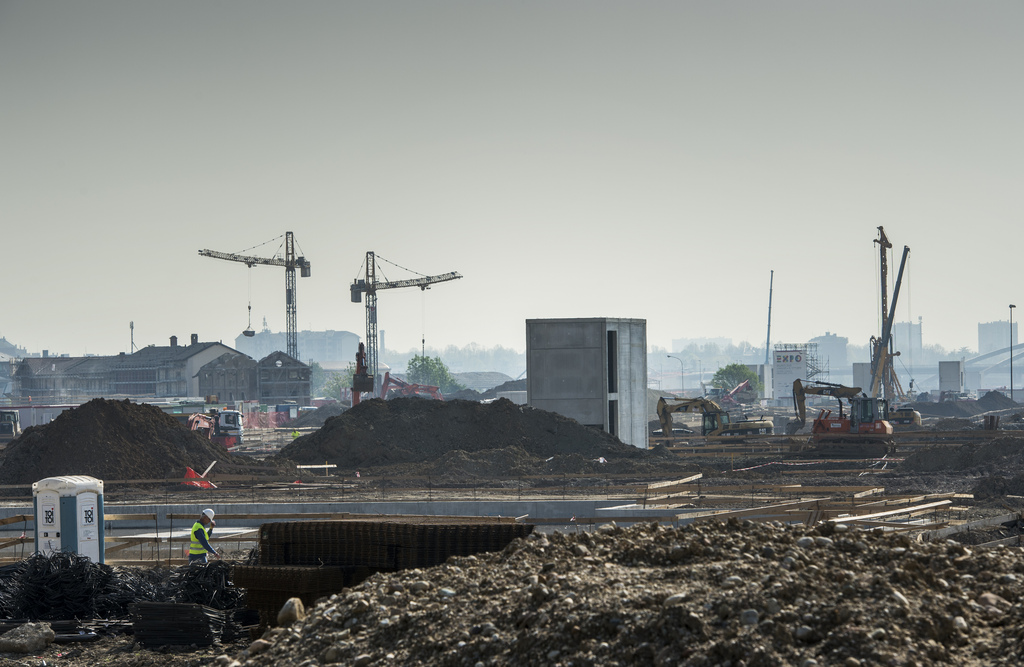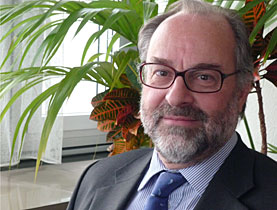
‘The Expo deals with a central issue for humanity’

Milan’s world Expo in 2015 will ensure that a huge number of countries and people are made aware of nutrition – one of the most pressing issues of our times, says Dante Martinelli, Switzerland’s Commissioner General to the Expo.
Martinelli, a diplomat from Italian-speaking Ticino, has a long career behind him as a Swiss ambassador to Italy, the European Union in Brussels, China (scene of the last Expo of 2010) and the United Nations in Geneva. He was appointed Commissioner General to the Expo in 2012. In an interview with swissinfo.ch he outlines his expectations for the Expo, which is being held under the motto “Feeding the planet – energy for life”, as well as what the Expo means for the Swiss.
swissinfo.ch: Universal expositions generate not only a lot of global interest, but also a lot of criticism. What’s the point of these huge events?
Dante Martinelli: Generally it’s accepted that universal Expos have in recent times been extremely successful and a magnet for visitors. Shanghai in 2010, Hannover in 2000 and Seville in 1992 all attracted huge numbers of people. They offer not only the host country, but also the participating ones, an extraordinary platform to showcase themselves to the world.
In addition, by choosing, as has recently been the case, a theme that has a global reach – as a thread running through the Expo – the events have gained an even greater resonance worldwide, with more countries taking part. Universal expositions are no longer seen just as commercial fairs, but as events that spark a big debate and take stock of a topic that is relevant to everyone. Milan’s theme, “Feeding the planet – energy for life”, is certainly a key issue for every country and a huge challenge for our future.
swissinfo.ch: But shouldn’t issues like this be dealt with by the UN or by international conferences?
D.M.: They are also dealt with by the UN, for example by the UN Millennium Development Goals, which include nutrition and eradicating hunger. They are a particular concern of the Food and Agriculture Organization and the World Food Programme, as well as several other specialised UN agencies, because nutrition also concerns, among other things, health, development, trade and intellectual property.
These are topics which have concerned experts for years, but are perhaps not quite so evident to the rest of the population. Universal expos are an important way of making these issues accessible to the man on the street and of hammering the message home to as many people as possible. What comes out of the expos can also be more easily digested than, say, a UN report.
swissinfo.ch: Why is it important for Switzerland to take part in the Expo Milano 2015?
D.M.: As for other countries, the Milan Expo is also for us an excellent window for showcasing what is really happening in Switzerland. We can show what we do, both on a public and private level, in the field of nutrition: from development cooperation to scientific research, from organic farming to preparing healthy foods, all sectors in which Switzerland is at the forefront.
Furthermore, the Expo Milano 2015 is of particular importance to Switzerland because Milan is only around 50 kilometres away from our border. The world Expo, with its expected 20 million visitors, should also have positive tourism and economic effects for the border regions, especially Ticino.
swissinfo.ch: The Swiss pavilion “Confooderatio Helvetica” is the third largest. What image do you want to project?
D.M.: The pavilion is made up of four towers full of food, which the public is allowed to eat as they please. It is meant to attract the visitors’ attention to the fact that the towers will get emptier as time goes on, and depending on consumers’ behaviour, there won’t be enough for everyone. We want to show Switzerland as a responsible country, which shows solidarity in nutrition issues and in its engagement over natural resources.
Swiss participation in Expo Milano 2015 is the responsibility of Presence Switzerland, the foreign ministry organisation that promotes the image of Switzerland abroad.
Government and parliament have approved a budget of CHF23.1 million ($26 million) for the pavilion, of which CHF8 million are to be funded by sponsors from the public and private sectors – cantons, cities and businesses.
“Confooderatio Helvetica” is to be the third largest pavilion at the fair, after the Italian and German ones. It will include four towers of glass and wood, filled with Swiss food products, which can be put to other uses at the end of the fair.
There will also be an adjoining building that houses a restaurant and exhibition space for partners and sponsors.
To raise Switzerland’s profile outside the fair, the government is putting on a programme of events called “Towards Expo Milano 2015”. This includes a “Tour of Taste”, which began on May 1, 2014, between Milan, Rome and Turin, and will encourage people get to know Switzerland.
The name of Switzerland’s pavilion, “Confooderatio Helvetica”, is an irreverent pun on the official Latin name of the Swiss federation, “Confoederatio Helvetica”, source of the “.ch” in Swiss internet addresses.
swissinfo.ch: Worldwide, the Swiss are big consumers, and are among those that waste resources. Can we really tell others what to do in terms of equitable division of resources?
D.M.: It’s not really about telling others what to do, but rather attracting attention to an extremely pressing issue, which concerns all of us, and to show what we are doing about it. Switzerland is most certainly among the most innovative nations when it comes to sustainable development, green issues, respect for the land, biodiversity support and the promotion of healthy food.
swissinfo.ch: The Swiss government has also decided to use the Expo Milano to promote Switzerland’s image in Italy. The real Switzerland doesn’t seem to be well known in Italy, despite the countries’ close relations.
D.M.: Neighbours with very close historical, political, economic and social relations often end up in clichés rather than deepening their mutual understanding of one another. A 2011 study by Presence Switzerland showed that Switzerland’s image in Italy was mostly based on clichés. Many were positive ones: Switzerland was seen, among other things, as tidy, clean, precise, well-working and beautiful.
Our presence at the world Expo and the accompanying programme “Towards Expo Milano 2015” are meant to introduce people to other aspects of Switzerland, including it being a country with a high level of education and research, with high-quality technology, services and industrial production. We want to give the impression of an open country which participates actively in international life.

swissinfo.ch: But Switzerland often appears to Italy and other European partners as rather isolated and inward looking. People have not understood some of its political decisions, like the vote on capping immigration. Do we have an image problem among our neighbours?
D.M.: I think that Switzerland on the whole still has a positive image, for example in terms of its political stability, the strength of its economy and the quality of its products. There is also its model of semi-direct democracy and federalism. But there are also image problems that are not just linked to our decisions, but also to the developments in Europe of the past few years.
It has been a difficult period for our European partners recently. So they are currently less inclined to devote their attention to Switzerland’s particular needs than, say, 10 or 20 years ago. The EU has also expanded in the last decade. More members obviously also means that the EU’s concerns are less focused on the Swiss “special case”.
Switzerland has a lot of work to do in the next years to explain and carry through its decisions. This also applies to its relations with its European partners. So the Expo Milano is certainly an important platform for promoting a positive and different image of our country in Italy and in Europe.
Born in Faido, in Italian-speaking Ticino, in 1947, Martinelli studied political science in Paris and joined the Swiss diplomatic service in 1979.
Postings during his long diplomatic career have included Washington, DC, where he was responsible for international financial relations and for relations with the IMF and the World Bank Group, and Paris, where he was Head of the Economic and Financial Service of the Swiss Embassy there.
From 1993-1996 he was diplomatic advisor to the head of the foreign ministry.
Martinelli was Swiss Ambassador in Italy (1996-1999), Ambassador and Head of the Swiss Mission to the European Communities in Brussels (1999-2004), and Swiss Ambassador in the People’s Republic of China (2004-2008). In November 2008, he was appointed Permanent Representative of Switzerland to the United Nations Office and other International Organisations in Geneva.
In 2012, just before he was due to retire, he was chosen to be Commissioner General to the Expo Milano 2015.
(Translated from Italian by Isobel Leybold-Johnson)

In compliance with the JTI standards
More: SWI swissinfo.ch certified by the Journalism Trust Initiative



























You can find an overview of ongoing debates with our journalists here . Please join us!
If you want to start a conversation about a topic raised in this article or want to report factual errors, email us at english@swissinfo.ch.